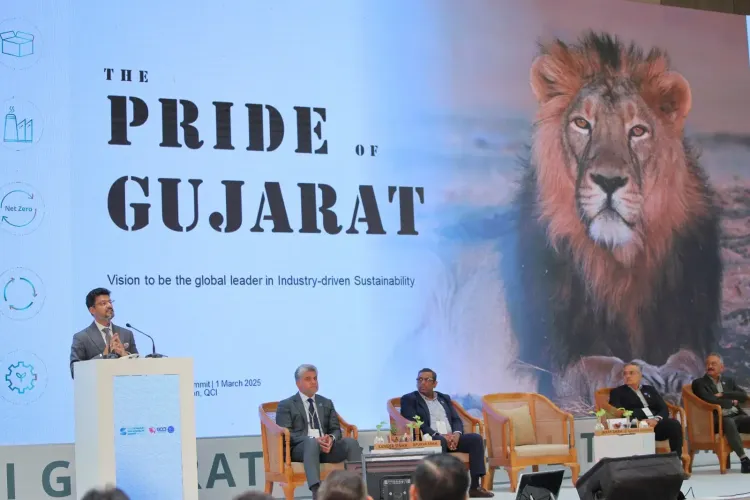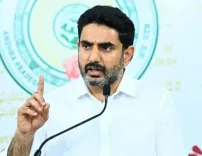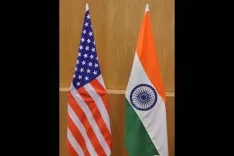Gujarat: GCCI Summit Showcases India's Pioneering Role in ESG and Green Economy

Synopsis
Key Takeaways
- The need for Indian businesses to align with international ESG standards.
- Formation of a dedicated ESG task force for MSMEs.
- Importance of sustainability in global supply chains.
- Collaboration across sectors is essential for impactful change.
- Gujarat's role in India's vision for a developed nation by 2047.
Ahmedabad, March 1 (NationPress) The Gujarat Chamber of Commerce & Industry (GCCI) successfully held the first GCCI Gujarat Sustainability Summit 2025 on Saturday.
The summit gathered over 30 distinguished speakers and knowledge partners from diverse sectors, along with global experts, to foster valuable discussions on Environmental, Social, and Governance (ESG) efforts.
This event served as a collaborative platform for policymakers, industry leaders, and sustainability specialists to share insights on worldwide best practices.
Delegates from the manufacturing, technology, energy, and finance sectors, including international representatives from the UK, Denmark, and the Netherlands, highlighted the global importance of sustainability and the necessity for collective actions.
GCCI President Sandeep Engineer welcomed Jaxay Shah, Chairperson of the Quality Council of India; Apurva Shah, Vice President of GCCI; Gaurang Bhagat, Honorary Secretary of GCCI; and Sameer Sinha, Chairman of the ESG Taskforce, along with other notable speakers and guests.
Engineer accentuated the summit’s significance as a vital step towards establishing a sustainable future for Gujarat, India, and the globe.
He emphasized that ESG is no longer just an industry catchphrase but a crucial global necessity. With regulators and consumers focusing on sustainability, he urged Indian enterprises to adapt to changing international standards, especially those defined by the European Union, to sustain their competitiveness in global supply chains.
He also introduced a dedicated ESG task force aimed at simplifying ESG compliance for Micro, Small, and Medium Enterprises (MSMEs), underlining the urgency of proactive ESG adoption in alignment with Prime Minister Narendra Modi’s sustainability initiatives such as Panchamrit.
In his keynote address, Jaxay Shah portrayed the summit as evidence of Gujarat’s industrial leadership and its contribution to India’s broader aim of becoming a developed nation by 2047.
He pointed out that under Prime Minister Modi’s guidance, India is positioning itself as a global center for renewable energy, sustainable manufacturing, and digital transformation. Shah presented the PRIDE framework—Preserve & Protect, Reduce Carbon, Impact & Innovate, Dominate through Diligence, and Evolved Ecosystem—as a strategic guide for India’s sustainable industrial advancement.
He stressed that Gujarat should spearhead sustainable development to align with the nation’s goals for economic and environmental enhancement. Sameer Sinha reflected on key outcomes from the summit, asserting that the path to a sustainable future necessitates active involvement from businesses, policymakers, academia, and civil society.
He highlighted the summit’s role as a driver for meaningful change and encouraged participants to convert discussions into actionable initiatives aligned with global sustainability standards.
More than 20 respected institutions, including IIT-Gandhinagar, the Centre for Sustainability and Corporate Governance Research, Indian Institute of Management Ahmedabad, and Adani University, enriched the discussions with valuable expertise. Sustainability leaders from prominent corporations also shared their insights and experiences.








